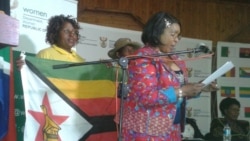The world commemorates International Women’s Day on Tuesday with indications that Zimbabwean women are still struggling to occupy top posts in government and other sectors though over the years the government has tried to promote gender equity.
The theme for this year's Day is “Planet 50-50 by 2030: Step It Up for Gender Equality.” The year 2030 is the deadline for the new Sustainable Development Goals, which include targets on achieving gender equality and empowerment of all women and girls, as well as ensuring inclusive and quality education for all and promoting lifelong learning.
In his message to mark the day, United Nations Secretary General, Ban Ki Moo, said “I remain outraged by the denial of rights to women and girls – but I take heart from the people everywhere who act on the secure knowledge that women's empowerment leads to society's advancement.
“Let us devote solid funding, courageous advocacy and unbending political will to achieving gender equality around the world. There is no greater investment in our common future.”
ZIMBABWE EMPOWERING WOMEN
Though some Zimbabweans openly marked International Women’s Day, some women said there is still a lot to be done for the country to achieve gender equality.
They said there is need for the nation to step up efforts to fully empower women, who have over the years been struggling to get equal opportunities like men.
The women commended some efforts being made by President Robert Mugabe in creating better chances for women to advance in society. The country once introduce some affirmative action measures that promoted the enrolment of more girls than boys at state universities and colleges. The impact of this move has not yet been measured.
Dr. Nyepudzai Nyangulu , director of Women in management, business and development Trust said while some women in Zimbabwe had managed to break barriers, there was need for women to work together and support each other to occupy top positions in different sectors.
“The sky is the limit for any woman to be in business, mining or anything. I encourage the nation and everyone to aim higher. Women should also get into consortiums and work together to do greater things especially considering this year’s theme of ‘Planet 50-50 by 2030, Step Up for Gender Equality’. Barriers are there and they can be conquered. Women can go beyond the selling of tomatoes. We even need to start thinking of beneficiation as women. As you grow your tomatoes for example how can you add value (on them).”
WOMEN SHOULD STAND UP AND FIGHT
Her views were echoed by Margaret Mukahanana Sangarwe, chairperson of the Zimbabwe Gender Commission, and the only woman chairing a state commission in Zimbabwe at the moment.
She said International Women’s Day gave everyone time to reflect on how they are ensuring that there is gender equality in Zimbabwe.
Mukahanana Sangarwe said, “This is the day where women can stand up to say how far have we gone and for men to look up to themselves and ask how far they have gone in promoting gender equality. We know the world is unequal in terms of gender. So, reflection is important. We can see that there are strides being taken, we need to do more to achieve the 50:50.”
Another women, Priscilla Misihairambwi Mushonga, who has broken barriers of inequality in the political sphere, and has served more than three terms in parliament, said as women fight for equality they should also deal with men who for long have thought power is their preserve.
Mushonga urged women not to give up fighting for equality.
PARLIAMENTARY REPRESENTATION
The eighth parliament of Zimbabwe was expected to set a record in the region and the world over by achieving a 50-50 representation in the 2013 July harmonised elections.
However, some women activists were angered by political parties in the country, who failed to field more women candidates, especially when the constitution advocates for such representation in all political offices in the country.
Zanu PF and the two Movement for Democratic Change formations fielded a combined 90 women compared to 663 males who participated in the elections, a far cry from equal representation.
In other sectors, women believe that they are still far from occupying top posts, while at the same time some of them normally fall victim to political violence.
One of them is Sheffra Dzamara, whose husband, Itai, was allegedly abducted by state security agents for urging President Mugabe to step down for failing to properly run Zimbabwe.
“Today is women's day and to women in Zimbabwe, I want to say women let us stand up and say no to abductions in Zimbabwe. Help me to speak out to the government of Zimbabwe to release my husband.”
It still remains to be seen whether Zimbabwe will achieve the set gender equity goals set by the United Nations as the nation has a long way to go in terms of gender parity. Meanwhile, some representatives of embassies in Harare, civic society groups and government today made a five kilometer walk to highlight issues the importance of gender parity.






